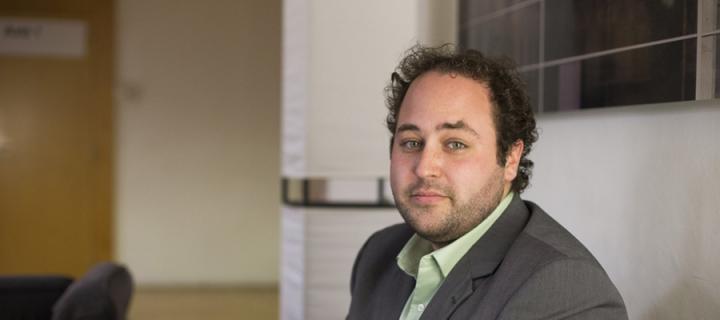Anthony Salamone
2013 graduate Anthony Salamone has been immersed in Brexit and European debates in recent years. Across his pursuits, he continues to make the case for studying and debating the European Union, its policies and future.
| Name |
Anthony Salamone |
| Degree |
MA (Hons) French and German and European Union Studies |
| Year of Graduation | 2013 |
Your time at the University

My time at the University was and has been defined by the study of Europe. For me, this longstanding interest has focused principally on politics, but also extends to language, culture and identity. Complementary to the University’s other fine attributes, one of my primary motivations for taking up my undergraduate offer was the opportunity to pursue a degree that combined European languages with European Union (EU) studies.
European studies are highly eclectic, incorporating politics, international relations, law, economics, history and languages, depending on the definition. The common objective is to explore and understand the processes of European integration (these days, disintegration is mentioned as well). In my degree, I pursued French and German for the language component – along with the other languages I studied in addition, these have proven to be worthwhile choices.
The foundation which I gained from my degree in the institutions, policies and evolution of the European Union was essential to how my career has subsequently progressed. A major part of that foundation was the Edinburgh Europa Institute, the University’s research centre on European integration. The Institute was established in 1968 and will mark its 50th anniversary this November.
Two experiences from my degree stand out in particular. One was my Erasmus year abroad, spent studying at Sciences Po Rennes in Brittany and the University of Vienna. My stays in both countries were transformative periods for cultural immersion which I enjoyed greatly. The other was establishing the European Union Society in my fourth year with a fantastic founding committee. The Society organises academic and social events on European affairs for students and the wider University community. It is a source of pride that, over five years later, the Society continues to host high-quality debates and indirectly provides the opportunity for students to learn how to organise major events.
Most recently, I co-founded the Scottish Centre on European Relations (SCER), an independent think tank based in Edinburgh. The aim of SCER is to enhance the quality of the EU debate in Scotland and to bring a Scottish perspective to European issues.
Your experiences since leaving the University
Well, I didn’t leave for very long! After graduation I completed an MSc in Global Politics at the London School of Economics, before returning to the University to begin a PhD in Politics. My doctoral research explores how senior UK government ministers framed EU membership in their discourse in the years prior to the EU referendum. This work has evidently coincided with an extraordinary and tumultuous period in Scottish and UK politics, and in the UK’s relationship with the European Union.
Those who know me will attest that I like to keep busy. Alongside my research I have been actively engaged in the Europa Institute, serving on its Steering Group. For three years I was also Co-Convenor of the Europa Research Group, its postgraduate forum for European studies. More broadly, I have endeavoured to make a contribution to public debate, engagement and education within and outwith the University on the European Union, Brexit and Scottish and UK politics.
In the year before the EU referendum, I established European Futures, the University’s academic blog on European affairs, and have served as Managing Editor since. I have also worked on the University’s Massive Open Online Courses (MOOCs) on politics and elections, assisting on two courses and then leading our MOOC on the EU referendum. I have remained active in the European Union Society and organised a range of public events on Brexit and the major European topics of the day, with strong attendance and interest.
Most recently, I co-founded the Scottish Centre on European Relations (SCER), an independent think tank based in Edinburgh. The aim of SCER is to enhance the quality of the EU debate in Scotland and to bring a Scottish perspective to European issues. However questions on Brexit and the constitution develop, it will certainly be busy days ahead!
Alumni Wisdom
I would offer two pieces of advice. One is to believe (or continue to believe) in the value of languages and language learning. No matter how universal English might become, linguistic and cultural diversity are important and have the potential to be extremely life-enriching. The other is to care about politics – at home, in Europe and across the wider world. It can be easy to tune out, but political decisions can and do affect you and everyone you know. Our choice to be politically aware and engaged is in the end the only way to shape society for the better.
Related Links
Department of European Languages and Culture
Scottish Centre on European Relations (external link)
Edinburgh University European Union Society (external link)

